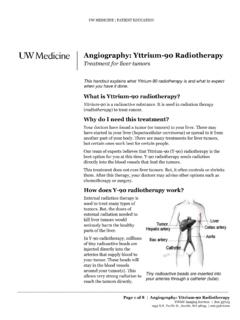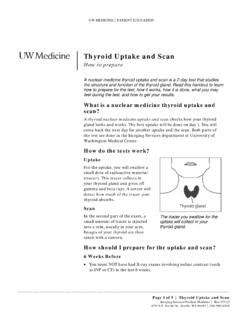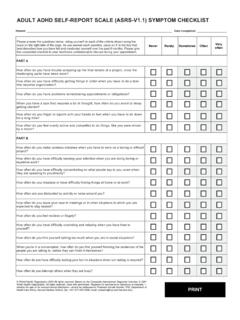Transcription of Adult ADHD Self-Report Scale (ASRS) Symptom Checklist
1 Name:_____ Adult ADHD Self-Report Scale (ASRS) Symptom Checklist Please answer the questions below, rating yourself on each of the criteria shown using the Scale on the right side of the page. As you answer each question, place an X in the box that best describes how you have felt and conducted yourself over the past 6 months. Never Rarely Sometimes Often Very Often 1. How often do you have trouble wrapping up the final details of a project, once the challenging parts have been done? 0 1 2 3 4 2. How often do you have difficulty getting things in order when you have to do a task that requires organization? 0 1 2 3 4 3. How often do you have problems remembering appointments or obligations? 0 1 2 3 4 4. When you have a task that requires a lot of thought, how often do you avoid or delay getting started? 0 1 2 3 4 5. How often do you fidget or squirm with your hands or feet when you have to sit down for a long time? 0 1 2 3 4 6. How often do you feel overly active and compelled to do things, like you were driven by a motor?
2 0 1 2 3 4 PART A 7. How often do you make careless mistakes when you have to work on a boring or difficult project? 0 1 2 3 4 8. How often do you have difficulty keeping your attention when you are doing boring or repetitive work? 0 1 2 3 4 9. How often do you have difficulty concentrating on what people say to you, even when they are speaking to you directly? 0 1 2 3 4 10. How often do you misplace or have difficulty finding things at home or at work? 0 1 2 3 4 11. How often are you distracted by activity or noise around you? 0 1 2 3 4 12. How often do you leave your seat in meetings or other situations in which you are expected to remain seated? 0 1 2 3 4 13. How often do you feel restless or fidgety? 0 1 2 3 4 14. How often do you have difficulty unwinding and relaxing when you have time to yourself? 0 1 2 3 4 15. How often do you find yourself talking too much when you are in social situations? 0 1 2 3 4 16. When you re in a conversation, how often do you find yourself finishing the sentences of the people you are talking to, before they can finish them themselves?
3 0 1 2 3 4 17. How often do you have difficulty waiting your turn in situations when turn taking is required? 0 1 2 3 4 18. How often do you interrupt others when they are busy? 0 1 2 3 4 PART B How old were you when these problems first began to occur? _____ Name: _____ The Mood Disorder Questionnaire (MDQ) The questionnaire should be used as a starting point. It is not a substitute for a full medical evaluation. Bipolar disorder is a complex illness, and an accurate, thorough diagnosis can only be made through a personal evaluation by your doctor. However, a positive screen here may suggest that you might benefit from seeking such an evaluation from your doctor. Regardless of the questionnaire results, if you or someone you know has concerns about your mental health, please contact your physician or another healthcare professional. INSTRUCTIONS: Please answer each question as best you can. 1. Has there ever been a period of time when you were not your usual self YES NO.
4 You felt so good or so hyper that other people thought you were not your normal self or you were so hyper that you got into trouble? .. you were so irritable that you shouted at people or started fights or arguments? .. you felt much more self-confident than usual? .. you got much less sleep than usual and found that you didn t really miss it? .. you were more talkative or spoke much faster than usual? .. thoughts raced through your head or you couldn t slow your mind down? .. you were so easily distracted by things around you that you had trouble concentrating or staying on track? .. you had much more energy than usual? .. you were much more active or did many more things than usual? .. you were much more social or outgoing than usual, for example, you telephoned friends in the middle of the night? .. you were much more interested in sex than usual? .. you did things that were unusual for you or that other people might have thought were excessive, foolish, or risky?
5 Spending money got you or your family in trouble? 2. If you checked YES to more than one of the above, have several of these ever happened during the same period of time? How much a problem did any of these cause you like being able to work; having family, money or legal troubles; getting into arguments or fights? o No Problem o Minor Problem o Moderate Problem o Serious Problem 3. Have any of your blood relatives ( children, siblings, parents, grandparents, aunts, uncles) had manic-depressive illness or bipolar disorder? 4. Has a health professional ever told you that you have a manic-depressive illness or bipolar disorder? Name:_____ Patient Health Questionnaire Over the last two weeks, how often have you been bothered by any of the following problems? (Circle to indicate your answer) PHQ9 Not at all Several days More than half of the days Nearly everyday 1. Little interest or pleasure in doing things 0 1 2 3 2. Feeling down, depressed, or hopeless 0 1 2 3 3.
6 Trouble falling or staying asleep, or sleeping too much 0 1 2 3 4. Feeling tired or having little energy 0 1 2 3 5. Poor appetite or overeating 0 1 2 3 6. Feeling bad about yourself or that you are a failure or have let yourself or your family down 0 1 2 3 7. Trouble concentrating on things, such as reading the newspaper or watching television 0 1 2 3 8. Moving or speaking so slowly that other people have noticed? Or the opposite being so fidgety or restless that you have been moving around a lot more than usual 0 1 2 3 9. Thoughts that you would be better off dead or hurting yourself in some way 0 1 2 3 If you checked off any problems, how difficult have these problems made it for you to do your work, take care of things at home, or get along with other people? Not difficult at all Somewhat difficult Very difficult Extremely difficult GAD-7 Not at all Several days More than half of the days Nearly everyday 1.
7 Feeling nervous, anxious or on edge 0 1 2 3 2. Not being able to stop or control worrying 0 1 2 3 3. Worrying too much about different things 0 1 2 3 4. Trouble relaxing 0 1 2 3 5. Being so restless that is hard to sit still 0 1 2 3 6. Becoming easily annoyed or irritable 0 1 2 3 7. Feeling afraid as if something awful might happen 0 1 2 3 If you checked off any problems, how difficult have these problems made it for you to do your work, take care of things at home, or get along with other people? Not difficult at all Somewhat difficult Very difficult Extremely difficult Wender Utah Rating Scale (WURS) Name: Date:_____ AS A CHILD I WAS (OR HAD): Not at all or very slightly Mildly Moderately Quite a Bit Very much 1. Active, restless, always on the go 0 1 2 3 4 2. Afraid of things 0 1 2 3 4 3. Concentration problems, easily distracted 0 1 2 3 4 4.
8 Anxious, worrying 0 1 2 3 4 5. Nervous, fidgety 0 1 2 3 4 6. Inattentive, day dreaming 0 1 2 3 4 7. Hot or short tempered, low boiling point 0 1 2 3 4 8. Shy, sensitive 0 1 2 3 4 9. Temper outbursts, tantrums 0 1 2 3 4 10. Trouble stick-to-it-tiveness, not following through, failing to finish things started 0 1 2 3 4 11. Stubborn, strong willed 0 1 2 3 4 12. Sad or blue, depressed, unhappy 0 1 2 3 4 13. Incautious, dare-devilish, involved in pranks 0 1 2 3 4 14. Not getting a kick out of things, dissatisfied with life 0 1 2 3 4 15. Disobedient with parents, rebellious, sassy 0 1 2 3 4 16. Low opinion of myself 0 1 2 3 4 17. Irritable 0 1 2 3 4 18. Outgoing, friendly, enjoy company of people 0 1 2 3 4 19. Sloppy, disorganized 0 1 2 3 4 20. Moody, ups and downs 0 1 2 3 4 21. Angry 0 1 2 3 4 22. Have friends, popular 0 1 2 3 4 23. Well organized, tidy, neat 0 1 2 3 4 24. Acting without thinking, impulsive 0 1 2 3 4 25. Tendency to be immature 0 1 2 3 4 26. Feel guilty, regretful 0 1 2 3 4 27.
9 Losing control of myself 0 1 2 3 4 28. Tendency to be or act irrational 0 1 2 3 4 29. Unpopular with other children, didn t keep friends for long, didn t get along with other children 0 1 2 3 4 30. Poorly coordinated, did not participate in sports 0 1 2 3 4 31. Afraid of losing control of self 0 1 2 3 4 32. Well-coordinated, picked first in games 0 1 2 3 4 33. (for women only) Tomboyish 0 1 2 3 4 34. Running away from home 0 1 2 3 4 35. Getting into fights 0 1 2 3 4 36. Teasing other children 0 1 2 3 4 37. Leader, bossy 0 1 2 3 4 38. Difficulty getting awake 0 1 2 3 4 39. Follower, lead around too much 0 1 2 3 4 40. Trouble seeing things from someone else s point of view 0 1 2 3 4 41. Trouble with authorities, trouble with school, visits to principles office 0 1 2 3 4 42. Trouble with police, booked, convicted 0 1 2 3 4 MEDICAL PROBLEMS AS A CHILD: 43. Headaches 0 1 2 3 4 44. Stomach aches 0 1 2 3 4 45. Constipation 0 1 2 3 4 46. Diarrhea 0 1 2 3 4 47. Food allergies 0 1 2 3 4 48.
10 Other allergies 0 1 2 3 4 49. Bedwetting 0 1 2 3 4 AS A CHILD IN SCHOOL: 50. Overall a good student, fast 0 1 2 3 4 51. Overall a poor student, slow learner 0 1 2 3 4 52. Slow reader 0 1 2 3 4 53. Slow in learning to read 0 1 2 3 4 54. Trouble reversing letters 0 1 2 3 4 55. Problems with spelling 0 1 2 3 4 56. Trouble with mathematics or numbers 0 1 2 3 4 57. Bad handwriting 0 1 2 3 4 58. Able to read pretty well, but never really enjoyed reading 0 1 2 3 4 59. Not achieving up to potential 0 1 2 3 4 60. Repeated grades (which grades?) _____ 0 1 2 3 4 61. Suspended or expelled (which grades?)_____ 0 1 2 3 4 Name:_____ The Epworth Sleepiness Scale The Epworth Sleepiness Scale is widely used in the field of sleep medicine as a subjective measure of a patient's sleepiness. The test is a list of eight situations in which you rate your tendency to become sleepy on a Scale of 0, no chance of dozing, to 3, high chance of dozing.















